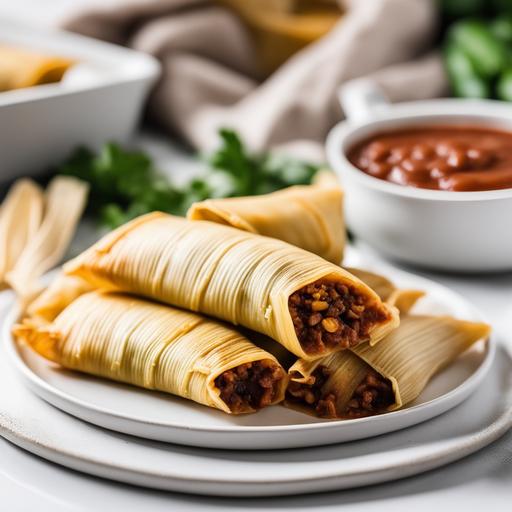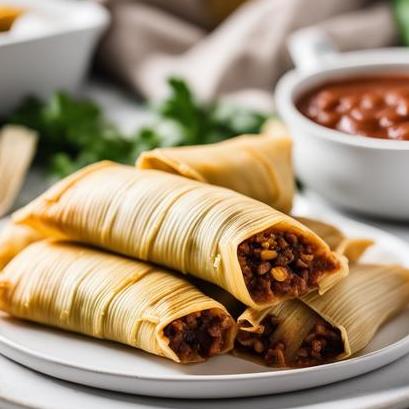
The Tantalizing World Of Tamales: A Detailed Guide To Perfecting The Tamales Oven Recipe
Tamales, a traditional Mesoamerican dish, are not only delicious but also a food experience that transcends cultures and generations. These delectable bundles of masa (corn dough) wrapped in corn husks and steamed to perfection hold a special place on the dining tables of many households. In this comprehensive guide, we will dive into the world of tamales, explore the food science behind their creation, discuss culinary details, share tips and variations, and provide a fully detailed oven recipe for preparing these delightful treats.
Understanding the Food Science Behind Tamales
The Role of Masa
At the heart of every tamale lies masa, the key ingredient responsible for its unique texture and flavor. Masa is a dough made from corn, specifically treated maize that has undergone a process known as nixtamalization. Nixtamalization involves soaking and cooking corn with an alkaline solution, typically lime water. This process not only enhances the nutritional quality of the corn but also improves its taste and texture.
The Magic of Steaming
The traditional method of cooking tamales involves steaming, which ensures a moist and tender final product. Steaming allows the flavors of the filling, as well as the masa, to meld together harmoniously. The steam penetrates the dough, creating a soft and slightly gelatinous texture that is a hallmark of well-prepared tamales.
Selecting the Perfect Ingredients
Now that we’ve established the fundamentals of tamales, let’s delve into selecting the perfect ingredients. From the corn husks to the filling, each component plays a vital role in crafting the ultimate tamale experience.
Choosing Corn Husks
Corn husks are an essential part of tamale making, as they provide the perfect wrapping for the masa and filling. When selecting corn husks, look for ones that are intact, pliable, and free from any signs of mold or damage. Soak the husks in warm water for around 30 minutes to soften them before use.
Masa Preparations
While store-bought masa is readily available, some believe that homemade masa elevates the tamale experience. If you choose to make your own masa, you’ll need dried corn kernels and an alkaline solution, such as slaked lime or food-grade calcium hydroxide. Soak the corn kernels in the alkaline solution overnight, then rinse and grind them into a fine paste. Be sure to add water as needed to achieve a dough-like consistency.
Cleaning and Preparing the Ingredients

Preparing the ingredients for tamales requires attention to detail to ensure a successful outcome. Let’s walk through the steps of cleaning and prepping to set the stage for tamale perfection.
Cleaning the Corn Husks
Before using corn husks, it’s essential to clean them thoroughly to remove any dirt or debris. Start by inspecting each husk individually, discarding any that show signs of damage. Prepare a large bowl of warm water and immerse the husks, gently swishing them around to dislodge any impurities. Rinse each husk under running water and pat them dry with a clean towel before using.
Preparation of the Masa
If you’ve chosen to make your own masa, there are a few steps involved in its preparation. After nixtamalizing the corn and grinding it into a paste, you’ll need to add water to obtain the desired consistency. Gradually add water, mixing it into the masa until it becomes flexible, moldable, and spreadable. The goal is to achieve a smooth and easy-to-work-with dough.
Tips and Tricks for Tamales Perfection
Now that our ingredients are selected, cleaned, and prepared, let’s explore some tips and tricks that will guarantee tamale perfection.
Assembling the Tamales
When assembling tamales, it’s crucial to apply the masa evenly while leaving enough space for the filling. Spread a thin layer of masa onto the corn husk, leaving about an inch of space on the sides. Place the filling in the center of the masa, shaping it into a neat, compact line. Avoid overfilling, as it can lead to difficulties when folding the tamale.
Tying the Corn Husks
After folding the tamale, secure it with a strip of corn husk or kitchen twine. This step is essential to maintain the tamale’s shape during steaming. Gently tie the husk around the tamale, ensuring it is tightly secured while being cautious not to squeeze out the filling.
Steaming the Tamales
Traditionally, tamales are cooked using a large steamer pot known as a tamalera. However, for those seeking the convenience of an oven recipe, fear not! We’ll share a detailed oven recipe shortly. When steaming tamales in an oven, line a baking dish with a moist kitchen towel, arranging the tamales in a single layer. Cover the dish with aluminum foil, sealing it tightly to trap the steam. The moist kitchen towel and aluminum foil combination will create a steamy environment for cooking the tamales to perfection.
Variations and Creative Filling Ideas

One exciting aspect of tamale making is the countless variations and diverse fillings one can explore. While the classic fillings, such as pork, chicken, or cheese, are undeniably delicious, let your culinary creativity take flight with these unique and mouthwatering filling ideas:
Vegetarian Delights
For those preferring vegetarian options, tamales offer a canvas for showcasing vibrant flavors. Consider fillings such as black bean and sweet potato, roasted vegetable medley, or even a smoky chipotle mushroom blend.
Seafood Sensations
Seafood enthusiasts can rejoice in the endless possibilities for tamale fillings. From shrimp and crab to a zesty ceviche-inspired filling, the ocean’s bounty can elevate your tamale experience to new heights.
Fusion Flavors
Experimenting with fusion flavors is another exciting way to infuse new life into tamales. Picture Asian-inspired tamales with teriyaki chicken, fusion fusion flavors such as Thai almond curry, or even Mediterranean-inspired fillings like spiced lamb with feta cheese.
Checking Doneness – A Crucial Step
Checking for doneness during the tamale-making process is essential to ensure a moist, perfectly cooked final product. When using an oven, follow these steps to assess the tamale’s readiness:
-
Carefully remove one tamale from the baking dish, ensuring minimal disruption to the rest.
-
Unwrap a small portion to expose the masa and filling.
-
The masa should be cooked through and firm, yet moist.
-
If the masa appears raw or sticky, return the tamale to the baking dish and continue steaming.
-
Repeat the process until all tamales are evenly cooked, adjusting the steaming time if necessary.
By performing these doneness checks, you’ll guarantee a tamale worthy of culinary applause.
The Tamales Oven Recipe
After exploring the culinary intricacies, food science, and various tips, it’s time to unveil the highly anticipated tamales oven recipe. Here’s a step-by-step guide to achieving tamale perfection:
Ingredients:
-
2 cups masa harina (corn flour)
-
1 1/3 cups chicken or vegetable broth
-
2/3 cup lard or vegetable shortening
-
½ teaspoon salt
-
Corn husks, soaked and cleaned
-
Filling of your choice
Instructions:
-
In a large mixing bowl, combine masa harina, salt, and lard or vegetable shortening.
-
Slowly add the chicken or vegetable broth, mixing thoroughly until a smooth, spreadable masa dough is formed.
-
Once the masa dough is ready, cover it and let it rest for about 30 minutes, allowing the flavors to meld.
-
Preheat your oven to 350°F (180°C). Line a baking dish with a moist kitchen towel.
-
Take a soaked corn husk and spread a thin layer of the masa dough onto it, leaving sufficient space on the sides.
-
Place the filling of your choice in the center of the masa dough, shaping it into a neat line.
-
Fold the corn husk over the filling, ensuring the masa completely encloses it.
-
Secure the tamale by tying a strip of corn husk around it, or alternatively, use kitchen twine.
-
Place the assembled tamales in the baking dish, arranging them in a single layer.
-
Cover the dish tightly with aluminum foil, sealing in the moisture.
-
Bake the tamales in the preheated oven for approximately 1 hour, or until the masa is cooked through and firm, yet moist.
-
Perform the doneness checks described earlier, adjusting the baking time if needed.
-
Once done, remove the tamales from the oven and let them rest for a few minutes before serving.
-
Unwrap the tamales from their husks and enjoy these delectable treats!
Conclusion
Congratulations! You’ve embarked on a culinary journey into the fascinating world of tamales. We hope this comprehensive guide has provided you with valuable insights into the food science, culinary details, and preparations required for mastering the tamale oven recipe. With attention to ingredients, preparation, and creativity, you can create an endless array of tamales that will tantalize the taste buds of family and friends. Embrace this traditional Mesoamerican delicacy and savor the joy of tamales that are perfectly cooked and bursting with flavor.
Sources
FAQS On Tamales Oven Recipe
What Ingredients Do I Need To Make Tamales In The Oven?
To make tamales in the oven, you will need the following ingredients: corn husks, masa harina (corn flour), vegetable shortening or lard, broth (chicken or vegetable), salt, a protein of your choice (such as shredded chicken, beef, or pork), and a variety of spices and seasonings for flavoring.
How Long Does It Take To Cook Tamales In The Oven?
The cooking time for tamales in the oven can vary depending on the recipe and the size of the tamales. On average, it takes about 1.5 to 2 hours to cook tamales in the oven at a temperature of 350°F (175°C). However, it is always recommended to check the tamales periodically to ensure they are thoroughly cooked.
Can I Freeze Tamales Made In The Oven?
Yes, you can freeze tamales made in the oven. Once the tamales are completely cooled down, you can wrap them individually in plastic wrap or aluminum foil and place them in a freezer-safe bag or container. Frozen tamales can be stored for up to 3 months. When ready to enjoy, simply thaw them in the refrigerator overnight and reheat in a steamer or microwave.
How Do I Know If The Tamales Are Fully Cooked?
The best way to check if the tamales are fully cooked is by performing the "float test." Once the cooking time is up, carefully remove one tamale from the oven and let it cool slightly. Fill a bowl or sink with warm water and gently place the tamale in the water. If it floats easily, it indicates that the tamale is cooked through. If it sinks, it needs more cooking time.
Can I Substitute Ingredients In A Tamales Oven Recipe?
Yes, you can modify the ingredients in a tamales oven recipe based on your preferences or dietary restrictions. For example, you can substitute vegetable shortening or lard with vegetable oil or coconut oil for a healthier alternative. You can also experiment with different protein options or add additional veggies and spices to customize the flavor according to your liking.


